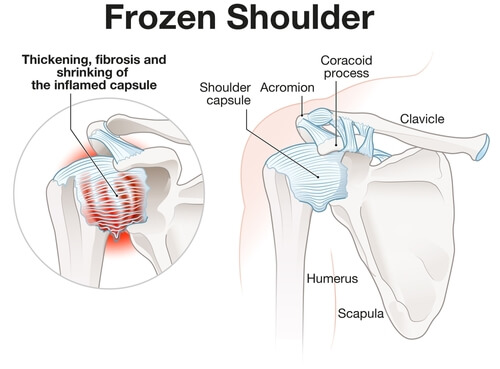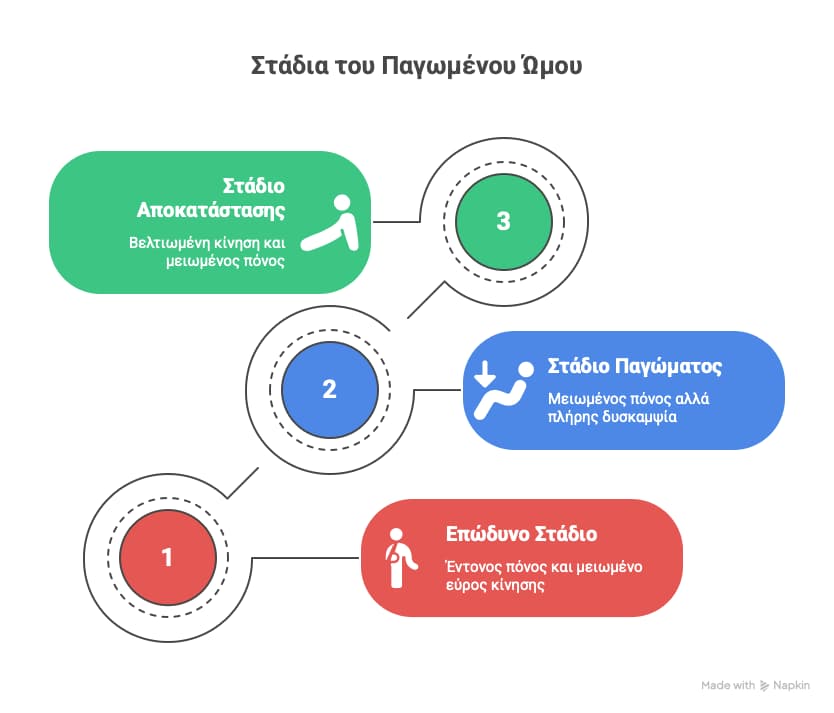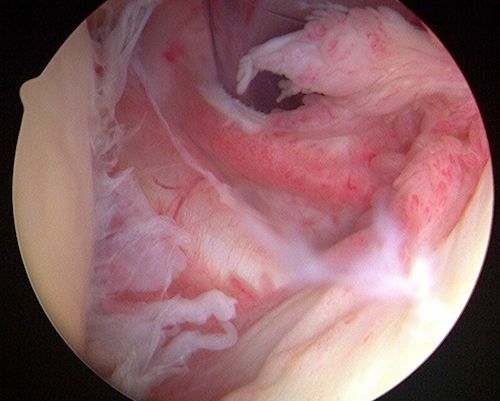Georgios Panagopoulos MD | Orthopaedic Surgeon

Frozen shoulder is a condition characterised by inflammation of the joint capsule, leading to pain and restricted range of motion. Reduced external rotation of the shoulder is frequently the salient feature. Mainstay of treatment is physiotherapy, followed, if unsuccessful, by surgery.
Table of contents
What is frozen shoulder?
Frozen shoulder is a painful condition in which inflammation causes reduced motion of the shoulder, or stiffness. It is also called adhesive capsulitis. Symptoms typically start slowly, then they get worse. The condition is self-limiting, meaning it usually resolves on its own, but it may take 1-2 years.
Frozen shoulder. is usually a benign and self-limiting disease. After an acute phase, it gradually gets better, but recovery may take months or years. Physiotherapy focusing on regaining range of movement, is the mainstay of treatment.
What causes frozen shoulder?
Frozen shoulder is more commonly seen in women between the ages of 40-60. It can be idiopathic (unknown etiology), or secondary to an undelying condition, such as diabetes or a thyroid disorder. Long standing immobilisation, ie after a fracture or after surgery, can also lead to frozen shoulder (post-traumatic & postoperative frozen shoulder).

Frozen shoulder develops when the strong connective tissue around the shoulder or joint capsule, that contains all the ligaments that hold the ball in the socket, becomes thick and inflamed. As a result, the shoulder gets stiff and becomes “frozen”, it cannot move anymore.



What are the symptoms of frozen shoulder?
Frozen shoulder typically manifests in 3 stages:
- Freezing stage (stage 1): This stage takes 2-9 months. The shoulder becomes gradually more painful to move and movement starts to become limited.
- Frozen stage (stage 2): This stage lasts 4-12 months. The shoulder is stiff, and its use is limited, but pain becomes less pronounced.
- Thawing stage (stage 3): This is the recovery stage and may last 5 to 24 months. The shoulder begins to move again.

Symptoms of frozen shoulder may include:
- Shoulder Pain
- Περιορισμός του εύρους κίνησης, ειδικά της έξω στροφής
- Stiffness & περιορισμένη κινητικότητα
- Night pain & nocturnal awakenings
- Inability to perform activities of daily living
Diagnosis
Diagnosis is based mainly on history and physical exam. Dr Panagopoulos will take a detailed history and perform a thorough physical exam. The doctor like act you to raise your arm on your own. This determines your “active range of motion”. Then the doctor will move your arm passively. This determines your “passive range of motion”. In frozen shoulder, passive and active range of motion are the same. An x-ray will be also ordered to rule out any other shoulder pathology, such as arthritis. Other imaging modalities, such as ultrasound or MRI are usually not needed, but may be ordered if the diagnosis is in question.
Treatment for frozen shoulder
Conservative treatment
Conservative treatment for frozen shoulder includes:
- Stretching exercises.
- Physiotherapy/home exercise program for strengthening and stretching exercises
- Steroid injection(s) in the glenohumeral joint. Dr Panagopoulos can perform this injection under ultrasound guidance in the office.
- Hydrodilatation with normal saline
The condition can be self-limiting, meaning it may resolve on its own, but it may take 1-2 years.
Surgical Treatment

If conservative treatment fails to improve pain and stiffness, surgery is the next natural option. Surgical treatment typically involves shoulder arthroscopy, which is done through small keyholes, in a minimally invasive fashion (arthroscopic capsular release). Through these small incisions, the surgeon can introduce a camera and small instruments into the joint. The surgeon then releases the frozen capsule, improving dramatically the restricted range of motion. This is a day procedure & the patient may return home the same day if they wish.
The procedure is performed with a combination of general and regional anaesthesia, which allows an analgesic effect for 12-18 hours postoperatively. Commonly prior to the procedure an exam under anaesthetic, or EUA is performed followed by a manipulation under anaesthetic, or MUA. If the MUA is successful, the arthroscopic part of the procedure might not be needed.
After surgery, an individualised physiotherapy program is needed, to regain range of motion and strength. Compliance to this is paramount for timely return to work and activities of daily living.
Physiotherapy should ideally start as soon as possible, even the day after the procedure. If physiotherapy is suboptimal, there is a high likelihood of recurrence.
Exercises for frozen shoulder
Physiotherapy is very important both preoperatively and postoperatively. 90% of patients get better with physiotherapy alone. Physiotherapy is also important after surgery, to maintain the surgical results and optimise the outcome.

Dr Panagopoulos has extensive experience in the treatment of shoulder conditions, and will discuss with you all the available therapeutic options during your visit in the office.
FAQs - Frequently Asked Questions
What is frozen shoulder?
Frozen shoulder is a painful condition in which inflammation causes reduced motion of the shoulder, or stiffness.
What causes frozen shoulder?
– Idiopathic (unknown cause) – > the most common type
– Post-traumatic – > due to protracted immobilisation
– Postoperative
Diagnosis - what tests should I have?
– History & clinical exam
– X-rays
– Ultrasound
– MRI
What's the treatment for frozen shoulder?
– Physiotherapy -> the Α to Z
– Cortisone injection under US-guidance
– Shoulder arthroscopy, if all the above fail
Is physiotherapy important?
Physiotherapy is paramount, and must start as soon as possible, ideally on postop day 1. If not, the outcome of the surgery may be compromised.
Find us
Book an appointment with us today
